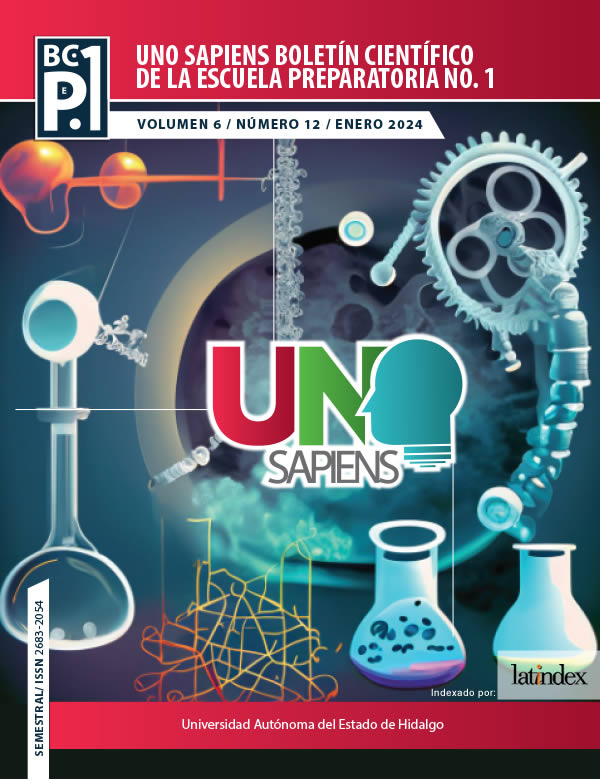Proteínas vegetales: la clave para la alimentación basada en plantas
Vegetable proteins: the key for plant-based food
DOI:
https://doi.org/10.29057/prepa1.v6i12.11788Palabras clave:
Alimentación basada en plantas, Proteínas vegetales, Vegetarianismo, Análogos de carneResumen
Este ensayo explora el concepto de alimentación basada en plantas, los tipos de dietas asociadas, los beneficios nutricionales de este tipo de alimentación, así como sus ventajas ambientales mencionando también estadísticas relacionadas con consumidores apegados a este tipo de alimentación y las tendencias actuales en el desarrollo de alimentos basados en plantas o análogos de carne. Al comprender estos aspectos, es posible tomar decisiones informadas que no solo beneficiará el bienestar individual, sino que también contribuirán a un futuro más sostenible para el planeta. Actualmente, la investigación y desarrollo de alimentos análogos de carne a base de proteína vegetal son una tendencia mundial, dirigida a contribuir en la disminución de los efectos perjudiciales de las dietas basadas en proteína de origen animal, así como minimizar el impacto ambiental de su producción.
Citas
Loveday S. M. Food Proteins: Technological, Nutritional, and Sustainability Attributes of Traditional and Emerging Proteins. Annu Rev Food Sci Technol. 2019; 10(1), 311-39.
Sá, AGA, Moreno, YMF, Carciofi, BAM. Food processing for the improvement of plant proteins digestibility. Critical reviews in food science and nutrition. 2020; 60(20), 3367-3386.
Grant, JD. Time for change: Benefits of a plant-based diet. Canadian Family Physician. 2017; 63(10), 744-746.
McClements DJ, Grossmann L. The science of plant‐based foods: Constructing next‐generation meat, fish, milk, and egg analogs. Compr Rev Food Sci Food Saf. 2021; 20(4):4049-100.
Thakur S, Pandey AK, Verma K, Shrivastava A, Singh N. Plant‐based protein as an alternative to animal proteins: A review of sources, extraction methods and applications. Int J Food Sci Technol. 2023; 16663.
Pingali P, Boiteau J, Choudhry A, Hall A. Making meat and milk from plants: A review of plant-based food for human and planetary health. World Dev. 2023; 170:106316.
Soto-Aguilar F, Webar J, Palacios, I. Alimentación basada en plantas: Sus mecanismos en la prevención y tratamiento de la obesidad. Revista de la Facultad de Medicina Humana. 2022; 22(1), 162-170.
Van Loo EJ, Caputo V, Lusk, JL. Consumer preferences for farm-raised meat, lab-grown meat, and plant-based meat alternatives: Does information or brand matter?. Food Policy, 2020; 95, 101931.
Moya Camarena SY. Nuevas guías alimentarias para la población mexicana y el Plato del Bien Comer [Internet]. [Consultado 30 sept 2023] Disponible en: https://www.ciad.mx/nuevas-guias-alimentarias-para-la-poblacion-mexicana-y-el-plato-del-bien-comer/).
Olfert MD, Wattick RA. Vegetarian Diets and the Risk of Diabetes. Curr Diab Rep. 2018;18(11):101.
McGirr C, McEvoy CT, Woodside JV. Vegetarian and Vegan Diets: Weighing the Claims. En: Temple NJ, Wilson T, Bray GA, editores. Nutrition Guide for Physicians and Related Healthcare Professionals [Internet]. Cham: Springer International Publishing; 2017 [citado 28 de septiembre de 2023]. 203-12. Disponible en: http://link.springer.com/10.1007/978-3-319-49929-1_20
Lynch H, Johnston C, Wharton C. Plant-Based Diets: Considerations for Environmental Impact, Protein Quality, and Exercise Performance. Nutrients. 1 de diciembre de 2018; 10(12):1841.
Xiao X, Zou PR, Hu F, Zhu W, Wei, ZJ. Updates on Plant-Based Protein Products as an Alternative to Animal Protein: Technology, Properties, and Their Health Benefits. Molecules. 2023; 28(10), 4016.
Nolden AA, Forde CG. The nutritional quality of plant-based foods Sustainability. 2023; 15(4), 3324.
Kyriakopoulou K, Dekkers B, Van der Goot AJ. Plant-based meat analogues. In Sustainable meat production and processing. Academic Press. 2019; 103-126.
Goldstein B, Moses R, Sammons N, Birkved M. Potential to curb the environmental burdens of American beef consumption using a novel plant-based beef substitute. Kunze G, editor. PLOS ONE. 2017;12(12):e0189029.
Rodríguez Martín, C. Vegan Land-Diseño UX/UI de una App. [Tesis lienciatura]. Universidad de Cataluña. España; 2020. Recuperado a partir de: http://hdl.handle.net/10609/119046.
Canedo, F.P. El 20% de los mexicanos se identifica como vegano o vegetariano. [Internet]. [Consultado 30 sept 2023]. Disponible en: https://www.elsiglodetorreon.com.mx/noticia/2023/el-20-de-los-mexicanos-se-identifica-como-vegano-o-vegetariano-en-la-red.html.
Hwang J, You J, Moon J, Jeong J. Factors Affecting Consumers’ Alternative Meats Buying Intentions: Plant-Based Meat Alternative and Cultured Meat. Sustainability. 2020; 12(14):5662. https://doi.org/10.3390/su12145662 en Safdar B, Zhou H, Li H, Cao J, Zhang T, Ying Z, Liu, X. Prospects for plant-based meat: Current standing, consumer perceptions, and shifting trends. Foods. 2023; 11(23): 3770.
Estrada RC. Consumo de productos basados en proteína vegetal crecerá 14% a 2035 en Latam. [Internet]. [Consultado 25 sept 2023]. Disponible en: https://www.larepublica.co/consumo/consumo-de-productos-basados-en-proteina-vegetal-crecera-14-a-2035-en-latam-3438514.
Crosser N. Plant-based meat, eggs, and dairy: 2019 U.S. state of the industry report. [Internet]. Good Food Institute; 2020. Report No.: 1-4. Disponible en: https://www.gfi.org/industry.
McClements DJ, Newman E, McClements IF. Plant‐based Milks: A Review of the Science Underpinning Their Design, Fabrication, and Performance. Compr Rev Food Sci Food Saf. 2019;18(6):2047-67.
Ishaq A, Irfan S, Sameen A, Khalid N. Plant-based meat analogs: A review with reference to formulation and gastrointestinal fate. Current Research in Food Science 2022; 5, 973-983.
.















